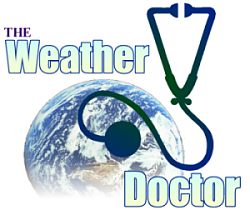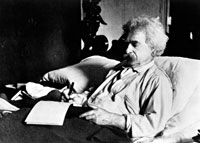 |
 |
| Home | Welcome | What's New | Site Map | Glossary | Weather Doctor Amazon Store | Book Store | Accolades | Email Us |
 | |||||||||
Mark Twain and the WeatherNoted American author Samuel L. Clemens, aka Mark Twain, has often been quoted as saying: "Everybody talks about the weather, but nobody does anything about it." Since no definitive link between Twain and that exact quote exists, some attribute it to his friend Charles Dudley Warner who wrote in an August 27, 1897 editorial in the Hartford (Connecticut) Courant: "A well-known American writer said once that, while everybody talked about the weather, nobody seemed to do anything about it." Perhaps Clemens was that "famous writer." And Robert U. Johnson, added in his autobiography Remembered Yesterdays (1923): "Nor have I ever seen in print Mark's saying about the weather, ‘We all grumble about the weather, but — but — but nothing is done about it.'"
Clemens knew weather and believed "Weather is a literary specialty, and no untrained hand can turn out a good article on it." His non-fiction books, Life on the Mississippi and Roughing It are filled with his often humorous observations. To wit, "Thunder is good, thunder is impressive, but it is lightning that does the work." When Twain was informed that readers complained his stories did not have enough weather in them and others thought there was too much, he decided to remedy the situation. He wrote some weather paragraphs, then left it to the reader to decide the best place for their insertion in The American Claimant (1892). He wrote in the opening pages of that book this charge to readers: THE WEATHER IN THIS BOOK."No weather will be found in this book. This is an attempt to pull a book through without weather. It being the first attempt of the kind in fictitious literature, it may prove a failure, but it seemed worth the while of some dare-devil person to try it, and the author was in just the mood." "Many a reader who wanted to read a tale through was not able to do it because of delays on account of the weather. Nothing breaks up an author's progress like having to stop every few pages to fuss-up the weather. Thus it is plain that persistent intrusions of weather are bad for both reader and author." "Of course weather is necessary to a narrative of human experience. That is conceded. But it ought to be put where it will not be in the way; where it will not interrupt the flow of the narrative. And it ought to be the ablest weather that can be had, not ignorant, poor-quality, amateur weather. Weather is a literary specialty, and no untrained hand can turn out a good article of it. The present author can do only a few trifling ordinary kinds of weather, and he cannot do those very good. So it has seemed wisest to borrow such weather as is necessary for the book from qualified and recognized experts-giving credit, of course. This weather will be found over in the back part of the book, out of the way. See Appendix. The reader is requested to turn over and help himself from time to time as he goes along." Twain knew his weather observing technique . . . sort of: "I knew, by my scientific reading, that either thermometers or barometers ought to be boiled to make them accurate; I did not know which it was, so I boiled them both." But then, "I did not wish to know when the weather was going to be good, what I wanted to know was when it was going to be bad..." And, "It is best to read the weather forecasts before we pray for rain." Attendance at an English production of Shakespeare left Twain unimpressed, but he remembered the weather in the production of King Lear. While he found the dialogue between the actors incoherent, when the storm appeared, he was consoled that "At least, it thunders in English."  His travels around the globe warranted many weather and climate comments. "The captain had been telling how, in one of his Arctic voyages, it was so cold that the mate's shadow froze fast to the deck and had to be ripped loose by main strength. And even then he got only about two-thirds of it back." (Following the Equator). On the oppressive climate of India, he also wrote in Following the Equator: "In India, ‘cold weather' is merely a conventional phrase and has come into use through the necessity of having some way to distinguish between weather which will melt a brass door-knob and weather which will only make it mushy." And about climate in general: "Climate is what we expect, weather is what we get."
"I could speak volumes about the inhuman perversity of the New England weather, but I will give but a single specimen," he said. "But it gets through more business in spring than in any other season. In the spring I have counted one hundred and thirty-six different kinds of weather inside of four and twenty hours." A collection of Twain's comments on weather and climate can be found in the "Elders Speak" section of this site as Mark Twain Comments on Weather and Climate. Photographs of Samuel Clemens courtesty The US Library of Congress.Written by
|
|||||||||
 |
To Purchase Notecard, |
Now Available! Order Today! | |
 |
 |
NEW! Now |
The BC Weather Book: |


